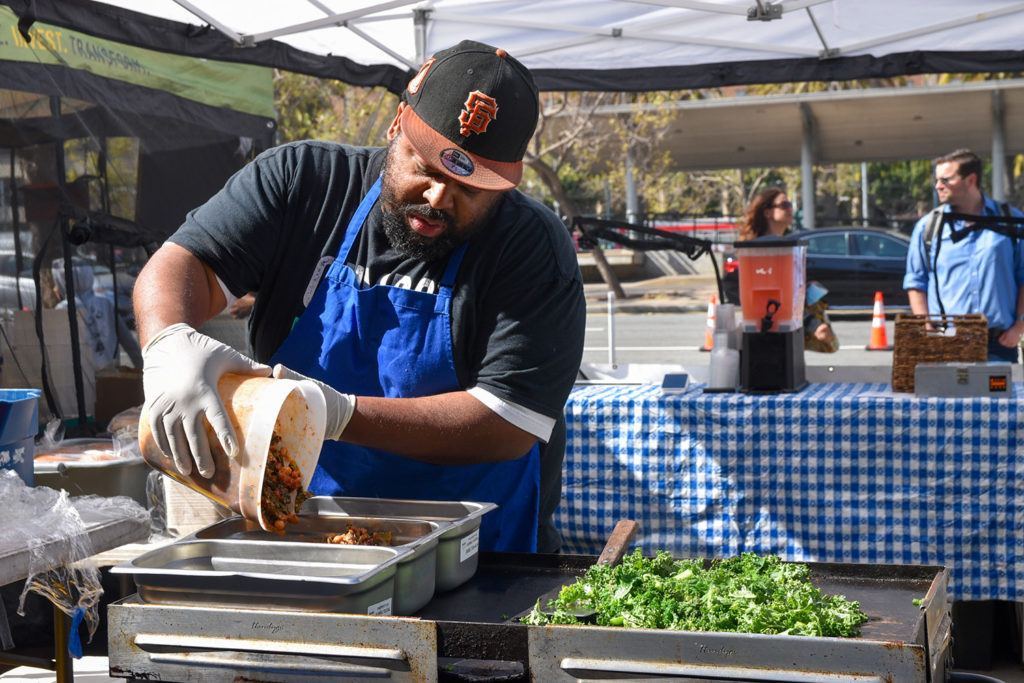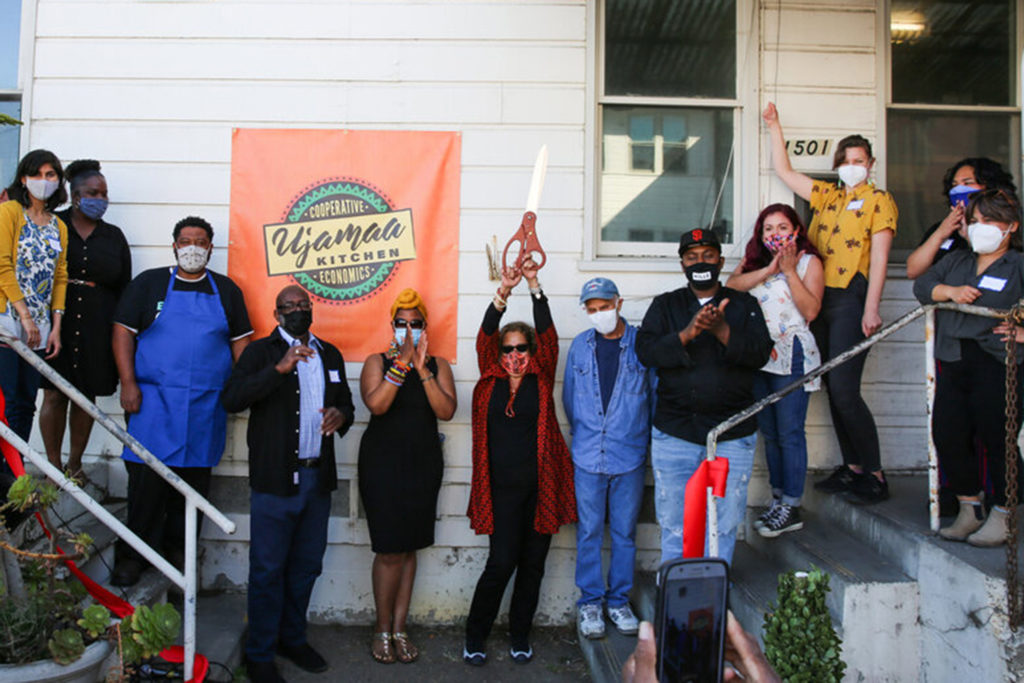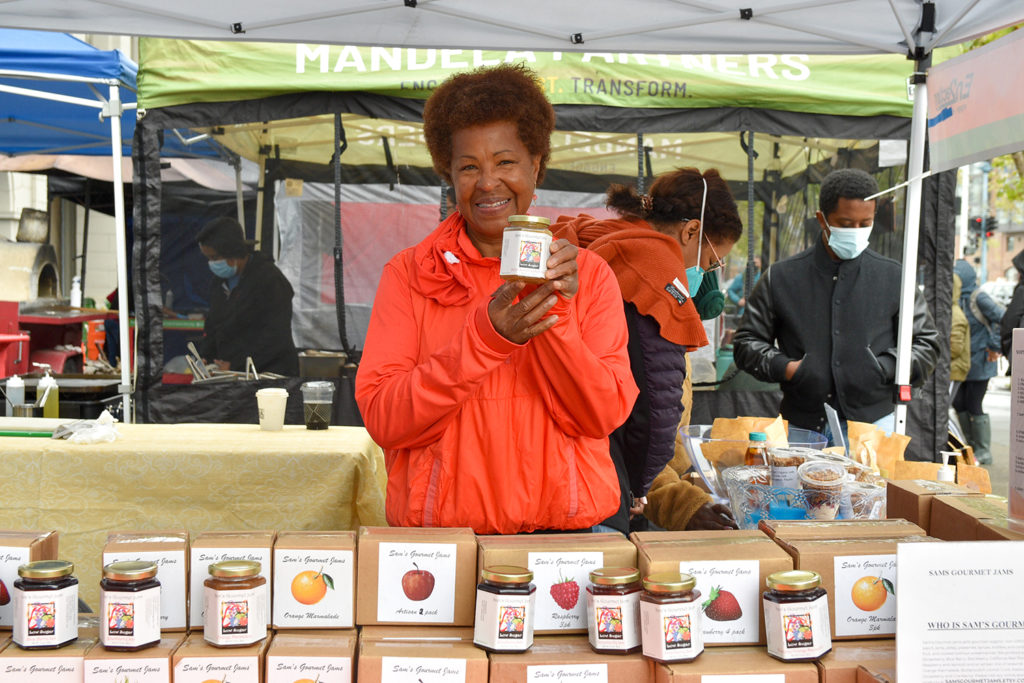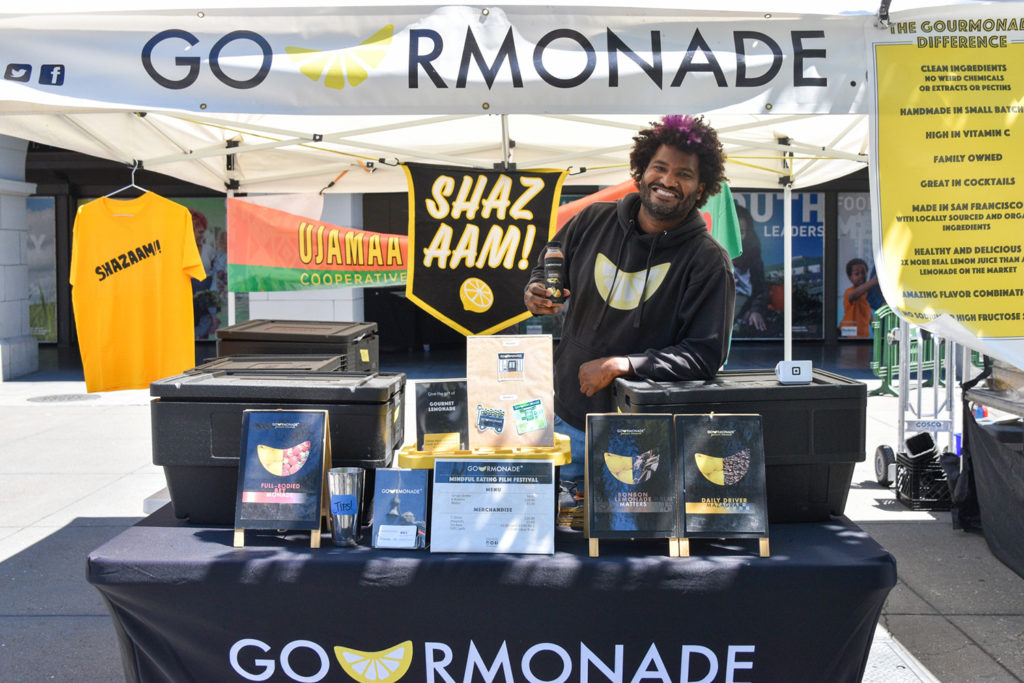En2action and Foodwise Partner to Offer Market Opportunities for BIPOC Chefs and Food Makers
Selina Knowles, Communications Coordinator
September 9, 2022

“When you’re trying to establish a business, it’s such a lonely experience, and you don’t want to get anything wrong because there’s a lot of risk attached to it,” says Amanuel Gebre, Junior Project Manager at En2action. “So, what we try to do is make sure that it’s not a lonely experience whatsoever, that you have a community backing you up.”
A local nonprofit based in Bayview–Hunters Point, En2action supports local Black, Indigenous, People of Color (BIPOC) business owners by providing assistance with community development and economic opportunities. This spring marked the beginning of an official partnership between Foodwise and En2action’s Ujamaa Kitchen to offer opportunities for Black chefs and food entrepreneurs to connect with the community at the Ferry Plaza Farmers Market.

Ujamaa Kitchen: Empowering Entrepreneurs through “Cooperative Economics”
After over 20 years of working as a chef in San Francisco, Dontaye Ball turned his catering side project into a full time food business: Gumbo Social. “During the pandemic, I lost my full time job, and I had an opportunity through En2action to grow and expand the business,” he says.
Participants in En2action’s Ujamaa Kitchen culinary program can access a collaborative commercial kitchen and entrepreneurial development opportunities, such as workshops with industry experts and connections to new markets. The program’s name honors the principle of “Ujamaa,” a Swahili word that translates roughly to “cooperative economics,” and reflects their commitment to the practice of shared social wealth.
“We know that every issue is always specific to that individual, but we also know that there are a lot of systemic challenges, too,” Amanuel says. Small businesses owned by People of Color face pervasive discrimination in accessing the three key determinants of small business viability: leadership education, credit and financial capital, and the marketplace.
“We really want to be able to reduce those limitations significantly, so the only thing that people ever need to worry about is just making the product that they want to create,” says Amanuel. Through Ujamaa Kitchen, Dontaye found support through technical and financial assistance, and connections to market opportunities, including the Ferry Plaza Farmers Market.

Expanding and Experimenting at the Farmers Market
When Foodwise (formerly CUESA) partnered with MegaBlack SF to host the first annual Juneteenth on the Waterfront in 2021, Foodwise reached out to En2action to invite Black chefs and food vendors in the program to participate. After working with the Ujamaa Kitchen team, a partnership developed naturally. Foodwise also partners with La Cocina and Mandela Partners to provide market opportunities for women-, immigrant-, and BIPOC-owned businesses.
En2action’s Ujamaa Kitchen joined the Thursday market in April 2022, with a rotating roster of talented local food makers of color popping up, including Gumbo Social, Sam’s Gourmet Jams, Gourmonade, and others. Ujamaa Kitchen vendors apply through En2action and then receive technical support from the Foodwise market operations team on market days.
Lulu Meyer, Foodwise Director of Market Operations says, “I think shoppers are always really excited to see something a little new and different. We’ve had a lot of positive feedback.” She adds, “A lot of the businesses are really go-getters in terms of marketing themselves.”
Shirley Moore, owner of Sam’s Gourmet Jams, grew up on a farm and learned to make jam from her grandmother. At the farmers market, she is not only happy to talk up her delectable low-sugar jams to curious customers, but also to welcome classes of elementary school students during Foodwise Kids field trips on Thursdays.
“Being able to create a bridge for food vendors and connecting them to a resource like the Foodwise market benefits them in the long run because they get the opportunity not only to present themselves to a different customer base, but also experiment a little bit,” says Amanuel.
Dontaye has made connections with local producers, and he incorporates their harvests into his cooking. “This is a farmers market, not a food court,” he says. “So, if we’re not supporting the farmers in some way, then what are we doing here? If I’m not trying to support Four Star Seafood or Rodriguez [Brothers] Farm, then what’s the purpose?”
This spring, Gumbo Social has popped up at over a dozen Thursday farmers markets, treating market visitors and the downtown lunch crowd to delicious offerings like chicken and sausage gumbo, California greens, and grilled shrimp po’boys. He also took the Foodwise Classroom stage at the second annual Juneteenth on the Waterfront, demonstrating his recipe for vegan gumbo, called California Greens.

Laying the Groundwork for Successful BIPOC Businesses
“Many people think that to sell food, you have to have a brick-and-mortar,” Amanuel says, ”but we try to find different ways for people to make any type of capital and to be profitable businesses.” The farmers market serves as an alternative space where businesses can have essential face-to-face interaction with customers, while expanding their audience.
“I think these opportunities lead to additional opportunities. Every market we do, we’re able to meet new people, and new ideas spring up,” says Dontaye. After having found his footing through pop-ups and catering, he plans to open a restaurant in the future.
With En2action, and other community partners, Foodwise is working to change the disproportionate barriers faced by BIPOC food makers who want to start businesses and sell at farmers markets. Lulu says, “As space opens up [in the farmers market], we’re trying to prioritize these businesses that come from our partner orgs: En2action, La Cocina, and Mandela Partners.” She is optimistic about the future of the partnership and sees potential for the pop-ups to expand to other market days.
Moving forward, Amanuel envisions En2action continuing to recruit as many people as possible and make it easy for them to grow their businesses, with hopes that as they become successful they will uplift others in the community, too. He says, “At the root of it all is making it so that businesses that are Black-owned and Brown-owned find successful footing within San Francisco.”
Visit the En2action booth at the Ferry Plaza Farmers Market on Thursdays.
Support En2action by attending Bayview Uncorked 2022: A Southeast – San Francisco Celebration at Pier 70 Saturday, November 5, 2022. Keep in touch with En2action by following them on Instagram @en2action and signing up for their e-letter here.
Topics: Building Equity program, Entrepreneurship, Equity, Partners
